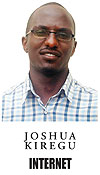Parents, teachers, the general society and governments are supposed to protect the world’s most precious and valued resource – our children. We have been protecting them from the influences of drugs, alcohol, bullying and gambling among many other traditional vices. However, there is one more influence, one more danger that we need to protect this young and impressionable generation from pornography.


Parents, teachers, the general society and governments are supposed to protect the world’s most precious and valued resource – our children.
We have been protecting them from the influences of drugs, alcohol, bullying and gambling among many other traditional vices. However, there is one more influence, one more danger that we need to protect this young and impressionable generation from pornography.
Today, children are in danger of being exposed to the grossest of pornographic images and sexual predators, thanks to the dark side of the Internet.
It has come at a time when the Internet has become a necessity for many of its users and the reason is obvious in today’s fast and highly interconnected world.
The real danger with unrestricted Internet access is that a child or a teen can access highly offensive and objectionable material on hundreds of thousands of sites.
Children can even access these sites accidentally and before their vulnerable minds know it, they get hooked.
Once hooked, this content has been known to affect their minds in so many ways that psychologists are continuously relating many behavioral conditions to the influence of pornography.
For one, pornography is known to greatly affect a child’s attitudes and values and also greatly interferes with the child’s development both sexually and identity-wise.
Also, sexual addiction and teenage pregnancies have been known to emanate from this influence.
Child molesters have also been known to scour the worldwide web for this unsuspecting group. This is possible because your children are frequently on e-mail, social networking sites and chat rooms.
In these mediums, they are frequently exposed to communicating with unidentified persons; there is no telling what they are up to.
By now, as a parent or educator, you may now feel overwhelmed and helpless, especially when even mobile phones can now access the Web. However, we have to do our job or else brace ourselves for a twisted and corrupt society in the not so distant future.
We can ask our Government to come up with legislation to punish child predators and come up with strict requirements for internet providers to put up filters for all offensive and obscene material, hard-core and soft-core alike, wherever our children access the Internet.
Also, we can teach our children on how to use the Net safely and avoid accessing those harmful sites. On this we can teach them how to exercise caution on what personal information they divulge on the Web, how to block offensive sites and how to flag offensive material.
Parents should be made aware of the prevalence of this vice and educated on the harmful effects of it.
They must also be taught how to intervene when this has already been happening and how to model and teach a healthy view of sexuality and identity.
This, I believe should be among our mainstream defenses against this vice, if at all our society is to survive the 21st century.
Joshua Kiregu is a journalist with The New Times


